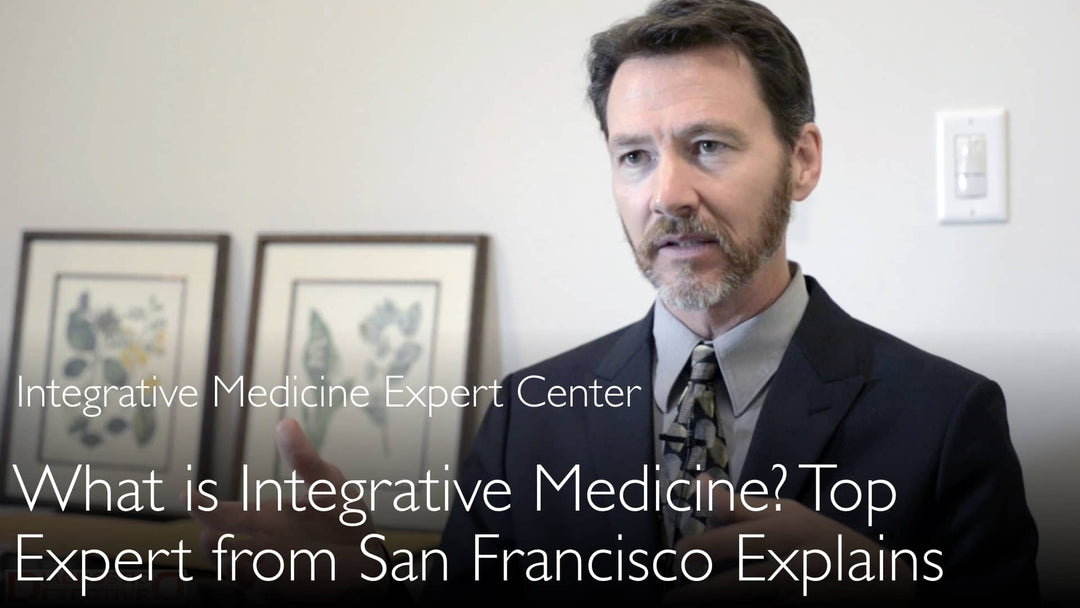Leading expert in integrative medicine, Dr. Kevin Barrows, MD, explains the principles and practices of integrative medicine, highlighting its combination of conventional and complementary therapies. Integrative medicine emphasizes evidence-based treatments, innate healing, and foundational health practices such as nutrition, exercise, and stress management. Dr. Kevin Barrows, MD, discusses how integrative medicine can be applied to conditions like cancer and irritable bowel syndrome, offering a holistic approach to patient care. He also underscores the importance of a second medical opinion to ensure accurate diagnosis and optimal treatment strategies.
Integrative Medicine: Principles and Applications
Jump To Section
- Definition of Integrative Medicine
- Five Categories of Integrative Medicine
- Evidence-Based Approach in Integrative Medicine
- Foundational Health Practices in Integrative Medicine
- Innate Healing Principle in Integrative Medicine
- Applications of Integrative Medicine
- Full Transcript
Definition of Integrative Medicine
Integrative medicine combines conventional medical treatments with complementary therapies to provide holistic patient care. Dr. Kevin Barrows, MD, emphasizes that integrative medicine seeks to integrate pharmaceutical and surgical treatments with therapies such as acupuncture, herbal medicine, and manual therapies. This approach aims to enhance patient outcomes by addressing the physical, emotional, and spiritual aspects of health.
Five Categories of Integrative Medicine
Dr. Kevin Barrows, MD, categorizes integrative medicine into five main areas: Mind-Body medicine, Energy medicine, Manual medicine, Biological therapies, and Whole systems. Mind-Body medicine includes practices like meditation and biofeedback. Energy medicine involves manipulating the bioelectric field for health benefits. Manual medicine encompasses therapies like chiropractic and massage. Biological therapies use natural substances like herbs and supplements. Whole systems include traditional practices like Chinese and Ayurvedic medicine.
Evidence-Based Approach in Integrative Medicine
Integrative medicine prioritizes evidence-based treatments, similar to conventional medicine. Dr. Kevin Barrows, MD, highlights the importance of scientific testing and clinical trials to validate the efficacy of therapies. However, integrative medicine also considers historical and traditional use as a form of evidence, recognizing the value of long-standing practices in systems like Chinese medicine.
Foundational Health Practices in Integrative Medicine
Foundational health practices are crucial in integrative medicine, according to Dr. Kevin Barrows, MD. These include nutrition, exercise, sleep, and stress management. Integrative medicine places extra emphasis on these areas, ensuring that basic health needs are met before introducing pharmaceuticals or natural medicines. This holistic approach supports overall well-being and enhances the body's natural healing processes.
Innate Healing Principle in Integrative Medicine
The concept of innate healing is central to integrative medicine. Dr. Kevin Barrows, MD, explains that all living beings have a natural tendency to heal and maintain balance. Integrative medicine focuses on identifying and removing obstacles that prevent the body from healing itself. This philosophical difference from conventional medicine underscores the holistic nature of integrative care.
Applications of Integrative Medicine
Integrative medicine can be applied to various health conditions, including cancer and irritable bowel syndrome. Dr. Kevin Barrows, MD, discusses how integrative approaches can complement conventional treatments, offering patients a comprehensive care plan. By incorporating therapies like mindfulness and acupuncture, integrative medicine addresses the multifaceted needs of patients, promoting healing and improving quality of life.
Full Transcript
Dr. Anton Titov, MD: What is integrative medicine? Sometimes integrative medical treatment works best. What are the most effective holistic medical treatments? How to use holistic integrative medicine properly? Foundational practices of integrative medicine. Innate healing principle. How to apply integrative medicine for cancer. How to use integrative medicine for irritable bowel syndrome.
Integrative medicine is a term being used more often now. Different patients assign different meanings to this term. What is integrative medicine?
Dr. Kevin Barrows, MD: The word "integrative" comes from the idea of integrating conventional medicine, pharmaceutical treatment, and surgical operations with complementary therapies. These medical practices come in many different categories, such as acupuncture, botanical medicines, herbal medicines, and manual therapies.
Dr. Anton Titov, MD: Could you please provide more details on the integrative medicine concept? How does integrative medicine fit into general traditional allopathic medicine?
Dr. Kevin Barrows, MD: Integrative medicine integrates conventional allopathic medicine in the West with some complementary therapies that might have origins in other cultures and distant times. It's useful to categorize those therapies into five categories. One category is mind-body medicine, which includes meditation, hypnosis, and biofeedback. Another is energy medicine, based on the principle that there's a bioelectric field emanated by all living beings, including humans, which can be manipulated for health benefits.
Manual medicine involves the practitioner putting their hands on the patient to achieve a therapeutic outcome, such as chiropractic, osteopathic, or massage therapies. Biological therapies are similar to the pharmaceutical model, involving herbs, supplements, natural medicines, probiotics, fish oil, and plant medicines to produce therapeutic biochemical effects. The last category includes whole systems like Chinese medicine, Ayurvedic medicine from India, and homeopathic medicine, which might employ many different kinds of complementary therapies under one system.
Integrative medicine borrows from these five categories and integrates them with patients' conventional care. It also includes foundational tenets shared with conventional medicine, such as being evidence-based. We prefer therapies tested scientifically and treatments with clinical trials showing efficacy. However, we have a broad definition of evidence, considering long-standing traditional use as a form of evidence, even if it hasn't been tested in a randomized control trial.
Integrative medicine places great emphasis on foundational health practices like nutrition, exercise, sleep, and stress management. We always start there, ensuring basic health practices are attended to before introducing pharmaceuticals or natural medicines. This approach ensures the body and mind have what they need to be healthy.
There is also a subtle philosophical difference between integrative and conventional medicine: the principle of innate healing. All living things have a natural tendency to heal, and integrative medicine emphasizes this concept. When a patient is ill, we first consider why they are not getting better on their own, as their body is a natural healing system. This philosophical difference characterizes integrative medicine.




